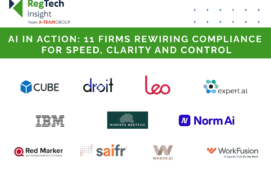
Innovative Systems’ FinScan AML Compliance solution has rolled out new perpetual KYC (pKYC) capabilities to bolster financial institutions’ ability manage evolving regulatory challenges and combat financial crime.
The new enhancements include identity document validation, adverse media screening, and dynamic risk scoring, providing a more proactive approach to managing customer risk in a fast-changing environment.“The financial crime landscape is becoming more sophisticated, and it is crucial for institutions to stay ahead of the curve and adopt innovative solutions,” said Bob Colonna, CEO of Innovative Systems, Inc. “Our goal is to provide financial institutions with the most advanced and comprehensive AML compliance technology.”
Perpetual pKYC offers financial institutions the ability to continuously monitor and update customer information in real time, but many organizations struggle with its implementation due to significant resource demands. As Steve Marshall, Director of Advisory Services at FinScan, explains to RegTech Insight, “pKYC requires substantial technological support and resources to function effectively, and the challenge often lies in the fragmented data systems and the quality of data organizations rely on.”
Traditional KYC models typically operate on a reactive basis, driven by periodic checks and compliance requirements that fail to account for ongoing customer risk. Marshall highlights that the shift toward perpetual KYC reflects the growing need for institutions to take a more holistic view of customer risk, one that includes behavioral patterns, external changes, and real-time data updates.
However, he also notes that many institutions face obstacles like data silos and poor data quality, which can hinder the effectiveness of these efforts. “Data is at the heart of any successful KYC program, and organizations need to overcome challenges like misaligned systems and inadequate data to truly capture the full scope of customer activities,” he says.
FinScan’s expanded capabilities aim to address these pain points in three areas:
- FinScan Validate, which provides frictionless, instant customer identity (ID) validation via comprehensive forensic document screening technology, helping compliance teams accurately and efficiently flag and exclude fraudulent and altered IDs.
- FinScan Media, FinScan’s adverse media screening solution scans global news sources for negative information associated with customers, allowing FIs to quickly identify and address potential red flags.
- FinScan Defend, which analyzes customer data and assigns a risk level, enabling FIs to perpetually monitor risk from various systems and rather than rely on less effective event-driven or periodic reviews to identify risks.
FinScan Defend is a dynamic risk scoring tool that enables institutions to move beyond the limitations of periodic reviews. “Traditional models rely on static data from account opening, which results in inaccurate risk ratings,” explains Marshall. “FinScan Defend provides a unified, real-time view of risk by incorporating a wide range of factors—customer behavior, geographic location, business relationships, and more.” This approach not only saves time but also enhances the accuracy of risk assessments, offering institutions a more robust defense against financial crime.
As the financial crime landscape evolves, regulations are also expanding. The recent extension of FinCEN’s AML and KYC rules to include buy-side firms such as investment advisors (IAs) places additional pressure on these institutions to meet compliance requirements. While smaller firms may feel the burden more acutely due to limited resources, Marshall emphasizes that FinScan’s solutions are designed to be adaptable. “The question isn’t about whether these tools are accessible to smaller firms,” he notes. “It’s about how they can help these firms use the data they already have more efficiently, while supplementing it with the necessary inputs to meet new regulatory standards.”
In an environment where financial institutions of all sizes are navigating complex regulatory landscapes, FinScan’s advanced KYC solutions offer a way forward, helping firms of all sizes proactively manage risk and maintain compliance.
Subscribe to our newsletter




